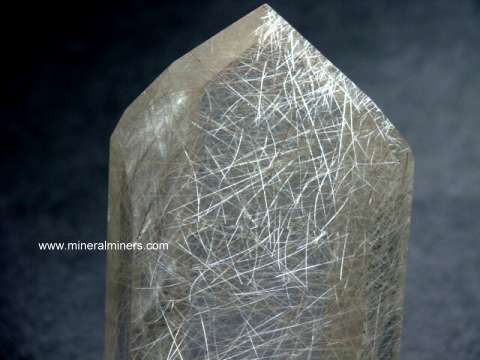



Links To Rutile in Quartz Information Topics On This Page:
Rutilated Quartz items in our VIRTUAL GALLERY
Rutilated Quartz Physical Properties
Rutilated Quartz Background Info
Rutilated Quartz Occurance and Diagnostic Features
Rutilated Quartz History and Uses
Rutilated Quartz Metaphysical Properties
Rutile in quartz is a macrocrystalline variety of the mineral Quartz (SiO2). Quartz is the most abundant single mineral on earth. It makes up about 12% of the earth's crust, occurring in a wide variety of igneous, metamorphic and sedimentary rocks.
Quartz varieties are commonly separated into two groups based on the size of the individual grains or crystals; macrocrystalline quartz in which individual crystals are distinguishable with the naked eye, and cryptocrystalline quartz in which the individual crystals are too small to be easily distinguishable under the light microscope.
Some of the macrocrystalline quartz varieties are: Amethyst, Ametrine, Cat's-eye Quartz, Citrine, Phantom Quartz, Rock Crystal, Rose Quartz, Rutile in Quartz and Smoky Quartz.
Blue Aventurine Quartz and Green Aventurine Quartz
are actually quartzites (a rock, not a mineral) composed essentially of interlocking
macrocrystalline quartz grains with disseminated grains of other color imparting minerals.
The cryptocrystalline varieties of quartz may be separated into two types;
fibrous and microgranular. Chalcedony is the general term
applied to the fibrous cryptocrystalline varieties.
Agate is an example of a fibrous cryptocystalline
banded chalcedony variety of quartz. Carnelian, Chrysoprase and bloodstone
are other chalcedony varieties.
Chert is the general term applied to the granular cryptocrystalline
varieties of quartz, of which flint and Jasper are examples.
Return to the Index of Rutile in Quartz Information Topics
Many different minerals can form as inclusions within quartz. One of
the most important varieties of included quartz for gem use is
rutile in quartz. Rutilated quartz usually occurs as rutile
rock crystal, rutile in smoky quartz or rutile in milky quartz.
Rutilated
quartz forms in quartz veins, usually with milky quartz bordering the vein
with quartz crystals growing in toward the center, growing around and
enveloping the rutile crystals traversing the vein.
Natural radiation from radioactive elements or adjacent radioactive rocks
can cause rutilated rock crystal
to assume a brown to gray color, known as rutile in smoky quartz.
The mineral corundum can occur with minute rutile inclusions oriented at an angle of 120 degrees from each other according to the hexagonal symmetry of the corundum. When this material is fashioned into a cabochon gem with the c axis of the corundum perpendicular to the base of the stone, reflected light from the rutile inclusions can concentrate on the surface of the gem forming white lines that intersect every 60 degrees forming a six ray star. This material is known as star ruby if the corundum is pinkish-red to red, or as star sapphire with a color prefix for all other colors except blue which is simply called star sapphire. See a selection of natural star sapphire jewelry.
Rutile in quartz is recognized by the characteristic rutile crystals passing
through the quartz. It can be identified as quartz by its crystal habit,
transparency, hardness, glassy luster, conchoidal fracture, occurance
and general lack of cleavage.
Index of Rutile in Quartz information topics
Pliny wrote nearly 2000 years ago that quartz crystals formed from ice by intense cold for long periods of time in dark clefts and caverns in the mountains. This general belief was popular in diverse cultures until the eighteenth century, when modern geology began to develope in Europe.
Rutile in quartz has been used as gemstones and other ornamental and religous objects for thousands of years.
Rutile in quartz has been referred to as Venus hair stone, Cupid's darts and Fleches d'amour.
The name quartz comes from the Saxon word querklufterz which meant cross vein ore.The name rutile comes from the Latin word rutilus meaning red.
Rutile is said to intensify the metaphysical properties of its host quartz crystal (see the metaphysical properties of rock crystal or smoky quartz). Rutilated quartz is also said to enhance one's understanding in difficult situations, thus facilitating timely and appropriate solutions. It is also said to relieve depression and loneliness, and to help provide new direction and enhance creativity.
Rutilated quartz is said to slow down the aging process and to help strengthen the immune system. It is also said to be a strong healer and to be helpfull in recovering from radiation exposure.
For more in-depth metaphysical information, see our Metaphysical Books section.
This is the end of our Rutile in Quartz Factsheet & Information page.